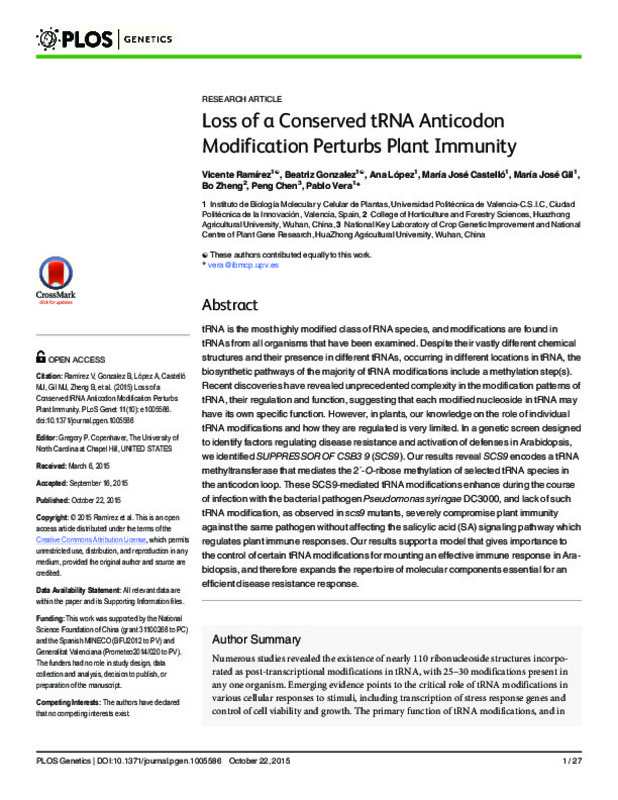Ramirez Garcia, V.; González-García, B.; López Sánchez, A.; Castelló Llopis, MJ.; Gil, M.; Zheng, B.; Cheng, P.... (2015). Loss of a Conserved tRNA Anticodon Modification Perturbs Plant Immunity. PLoS Genetics. 11(10):1-27. https://doi.org/10.1371/journal.pgen.1005586
Por favor, use este identificador para citar o enlazar este ítem: http://hdl.handle.net/10251/82413
|
Título:
|
Loss of a Conserved tRNA Anticodon Modification Perturbs Plant Immunity
|
|
Autor:
|
Ramirez Garcia, Vicente
González-García, Beatriz
López Sánchez, Ana
Castelló Llopis, María José
Gil, MJ
Zheng, Bo
Cheng, Peng
 Vera Vera, Pablo
Vera Vera, Pablo
|
|
Entidad UPV:
|
Universitat Politècnica de València. Instituto Universitario Mixto de Biología Molecular y Celular de Plantas - Institut Universitari Mixt de Biologia Molecular i Cel·lular de Plantes
|
|
Fecha difusión:
|
|
|
Resumen:
|
[EN] tRNA is the most highly modified class of RNA species, and modifications are found in tRNAs from all organisms that have been examined. Despite their vastly different chemical structures and their presence in different ...[+]
[EN] tRNA is the most highly modified class of RNA species, and modifications are found in tRNAs from all organisms that have been examined. Despite their vastly different chemical structures and their presence in different tRNAs, occurring in different locations in tRNA, the biosynthetic pathways of the majority of tRNA modifications include a methylation step(s). Recent discoveries have revealed unprecedented complexity in the modification patterns of tRNA, their regulation and function, suggesting that each modified nucleoside in tRNA may have its own specific function. However, in plants, our knowledge on the role of individual tRNA modifications and how they are regulated is very limited. In a genetic screen designed to identify factors regulating disease resistance and activation of defenses in Arabidopsis, we identified SUPPRESSOR OF CSB3 9 (SCS9). Our results reveal SCS9 encodes a tRNA methyltransferase that mediates the 2'-O-ribose methylation of selected tRNA species in the anticodon loop. These SCS9-mediated tRNA modifications enhance during the course of infection with the bacterial pathogen Pseudomonas syringae DC3000, and lack of such tRNA modification, as observed in scs9 mutants, severely compromise plant immunity against the same pathogen without affecting the salicylic acid (SA) signaling pathway which regulates plant immune responses. Our results support a model that gives importance to the control of certain tRNA modifications for mounting an effective immune response in Arabidopsis, and therefore expands the repertoire of molecular components essential for an efficient disease resistance response.
[-]
|
|
Palabras clave:
|
Yeast transfer-rna
,
DNA-damage response
,
Saccharomyces-cerevisiale
,
Salicylic-acid
,
Arabidopsis thaliana
,
Oxidative stress
,
Mutant reveals
,
Gene
,
Methyltransferase
,
Resistance
|
|
Derechos de uso:
|
Reconocimiento (by)
|
|
Fuente:
|
PLoS Genetics. (issn:
1553-7390
)
|
|
DOI:
|
10.1371/journal.pgen.1005586
|
|
Editorial:
|
Public Library of Science
|
|
Versión del editor:
|
http://doi.org/10.1371/journal.pgen.1005586
|
|
Código del Proyecto:
|
info:eu-repo/grantAgreement/GVA//PROMETEO%2F2014%2F020/
|
|
Agradecimientos:
|
This work was supported by the National Science Foundation of China (grant 31100268 to PC) and the Spanish MINECO (BFU2012 to PV) and Generalitat Valenciana (Prometeo2014/020 to PV). The funders had no role in study design, ...[+]
This work was supported by the National Science Foundation of China (grant 31100268 to PC) and the Spanish MINECO (BFU2012 to PV) and Generalitat Valenciana (Prometeo2014/020 to PV). The funders had no role in study design, data collection and analysis, decision to publish, or preparation of the manuscript.
[-]
|
|
Tipo:
|
Artículo
|









